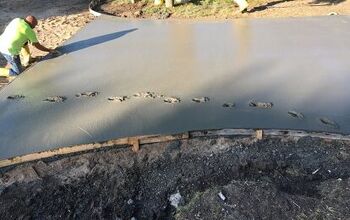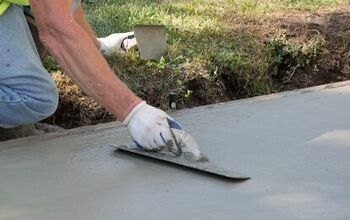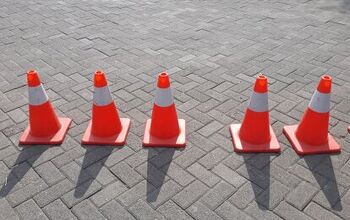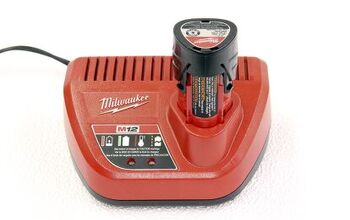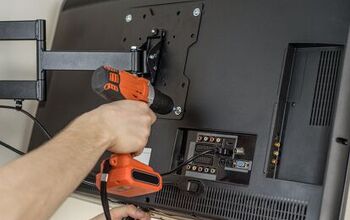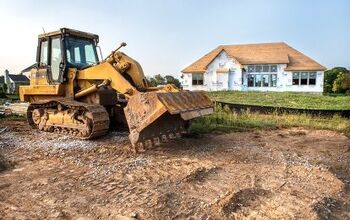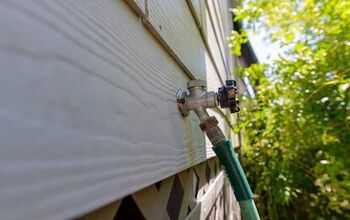Is My Driveway Private Property? (Find Out Now!)

Your property is a complicated piece of land. The property lines may not quite be what you thought and there are certain rights involved that you may or may not have been aware of. We generally assume, however, that the entirety of the property is considered to be private property.
But is that really true? Is your driveway private property? The short answer is “yes”. Someone intruding in your driveway without your permission would be technically trespassing. But there are different rules and regulations when it comes to your driveway than, say, other parts of your property. For trespassing to qualify in a driveway, typically intent has to be established first and foremost.
Do You Need a Brick and Stone Floor Contractor?
Get free, zero-commitment quotes from pro contractors near you.

Is a Driveway Private Property?
So, let’s establish the first thing. Yes, your driveway is considered to be private property. It is part of the overall property and is not to be treated as a public space, something like a park. Because your driveway is part of the property, it gets all of the benefits that apply to areas like the inside of your home or your vehicle.
For the most part, it also means that no one can come onto your driveway without your consent. For the most part, you will be able to have strangers who do so charged with trespassing. There are some other potential issues that you will need to be aware of as well.
Trespassing
While we know that a person can be charged with trespassing if they are in someone’s driveway without prior consent, it is not so simple as all that. In order to charge a person in your driveway with trespassing, there must first be established intent.
What does this mean? Well, if a random person just happens into your driveway, there isn’t a whole lot that you can do other than ask them to leave. So, unless you have told them previously that they are not welcome in your driveway, there is no way to determine what their intent was. Meaning that they may have entered by mistake, which is not considered to be illegal.
“No Trespassing Signs”
There are a couple of different caveats, one of which is the “no trespassing” sign. Depending on which state you live in, a person can potentially be charged with trespassing if they come onto your property when a “no trespassing” sign is displayed.
Of course, each state has its own set of laws when it comes to this type of signage. For instance, one state may have specific requirements when it comes to the placement and size of the sign. If you want to have one of these signs up, be aware of the regulations before doing so.
Fences and Gates
When it comes to driveways that have no fence or gate, there isn’t much for the homeowner to do. Someone who drives or walks into the driveway will generally face no legal ramifications. Where that changes is when the property owner tells them that they have to leave.
With gates and fences, however, that all changes. The gate or fence is a clear indication that visitors are not welcome on the property. Hopping the fence or gate is, in most cases, considered to be breaking the law. The vast majority of states will likely be in agreement on this fact. So, if you have a fence or gate that blocks off your driveway, you will have less of a hassle pursuing trespassing charges.
Civil Trespass
Though most trespassing situations typically involve a warning and perhaps police intervention, it doesn’t have to end there. There is always the option to take a trespasser to court if suing them is thought to be the best option.
Taking a trespasser to court is normal if they have either damaged or destroyed part of the property or something on the property. It is possible to sue for simple trespassing, but the case will be better if they stole, damaged, or destroyed something.
Just keep in mind that intent needs to be established to take someone to court. That typically means being able to prove that the person had been there before and warned to not come back. Or it might mean that you told them to leave, they refused, and the police were called.
Blocked Driveways
There is also the matter of a vehicle potentially blocking your driveway. If you come to find that a vehicle is either blocking the entrance or is parked in your driveway directly, you have two courses of action. You can either ask them to leave or call the police and have the vehicle towed.
A person who parks in your driveway, they may not be charged with trespassing but will likely get a citation from the police. It is important that you avoid having the vehicle towed directly yourself. Call the police and let them handle the issue. Doing so will help you stay out of any potential legal implications while also ensuring that the responsible party is held accountable.
Keep in Mind Limitations of Law Enforcement
There is a bit of a misconception about what the police can do when they show up for situations like this. Yes, they can have the vehicle towed or charge a person with trespassing. Yes, they can have the person removed from the premises.
But when it comes to search and seizure on personal property, they are limited. For instance, vehicles that are parked in a residential driveway cannot be searched unless a warrant is involved.
Do You Need a Brick and Stone Floor Contractor?
Get free, zero-commitment quotes from pro contractors near you.

Keeping Your Privacy
If you are a private person and do not want anyone coming onto your property, there are actions to take. Having a sign up is probably the cheapest way to ensure that no one can come onto your property without the risk of trespassing.
Though it is quite a bit more expensive, having a fence or gate constructed is indisputable. It takes clear intent for someone to get past the gate or fence. That makes it easier to charge them with trespassing.
Related Guide

Ryan Womeldorf has more than a decade of experience writing. He loves to blog about construction, plumbing, and other home topics. Ryan also loves hockey and a lifelong Buffalo sports fan.
More by Ryan Womeldorf












